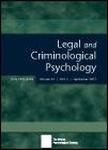版权所有:内蒙古大学图书馆 技术提供:维普资讯• 智图
内蒙古自治区呼和浩特市赛罕区大学西街235号 邮编: 010021

作者机构:Prairie View A&M Univ Dept Psychol POB 519MS 2600 Prairie View TX 77446 USA Univ Nevada Dept Criminal Justice Las Vegas NV 89154 USA Univ Nevada Dept Criminal Justice Interdisciplinary Social Psychol PhD Program Reno NV 89557 USA
出 版 物:《LEGAL AND CRIMINOLOGICAL PSYCHOLOGY》 (法律和犯罪心理学)
年 卷 期:2019年第24卷第1期
页 面:103-122页
核心收录:
学科分类:0402[教育学-心理学(可授教育学、理学学位)] 0301[法学-法学] 03[法学]
主 题:religion fundamentalism death penalty aggravating and mitigating circumstances attitudes
摘 要:Purpose Jurors religious characteristics are related to death penalty attitudes and verdicts. Jurors religious characteristics might also relate to endorsements of aggravating circumstances (aggravators) and mitigating circumstances (mitigators)-factors that make a defendant more or less deserving of the death penalty, respectively. The purpose of this research was to assess the extent to which religious fundamentalism was related to endorsement and weighing of aggravators and mitigators and subsequent death penalty decisions while controlling for relevant religious and demographic characteristics. Methods Two studies were conducted. Study 1 included a regression analysis in which participants filled out religious and demographic measures via an online survey. In Study 2, participants acted as mock jurors in a death penalty trial in which the defendant was already found guilty. Mock jurors read the case facts and attorney arguments and then weighed aggravators and mitigators before recommending a sentence for the defendant. Results In Study 1, fundamentalism negatively predicted mitigator endorsement, intrinsic religiosity negatively predicted aggravator endorsement, and orthodoxy positively predicted aggravator endorsement. In Study 2, fundamentalism was related to death penalty sentences, and this was mediated by people s weighing of aggravators and mitigators. Specifically, fundamentalism was related to a lower likelihood of choosing a life sentence because fundamentalism was negatively related to weighing mitigators over aggravators. Conclusions Results support and explain prior research linking fundamentalism with punitiveness in death penalty cases. Such findings support the eye for an eye punishment philosophy associated with fundamentalist beliefs. Theoretical and legal implications are discussed.